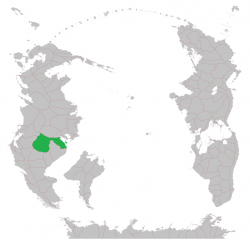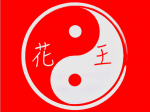Huawan (Pacifica)
The Unitary Peocracy of Huawan 花王派尼克帝国 | |
|---|---|
Motto: 神の霊を守れ! "Protect God's Spirits!" | |
 Location of Huawan in Pacifica | |
| Location | Midwest Cordilia bordered by the Xiongwei Mountains, Kringalian Strait and the South Pacific Ocean |
| Capital | Lián |
| Largest city | XinYue |
| Official languages | Standardized Mandarin(Putonghua), Eastern Japanese(Kyoto-style), Cantonese (Gwóngdūng wá) |
| Demonym(s) | Paeonisian |
| Government | Unitary peocracy Semi-Absolute Monarchy |
| The Peony, Doctor Yan | |
| Lord Sima Yi | |
| Lord Kim Sol | |
| Lord-Admiral Zheng He | |
| Lady-Miss Diao Chan | |
| Lady Renatta Yokosuki | |
| Legislature | Parliament |
| Royal Council | |
| People's State Council | |
| Formation | |
• Bronze Age Pre-Imperialist Nomads | 2200 BCE |
• Hsi-Hsia Khanate | 600 BCE |
• The SongHwa Empire | 543 |
• The SeonDeok Empire | 875 |
• Altan Khanate | 1038 |
• LiuSong Dynasty | 1220 |
• The Feng Empire | 1380 |
• Taizong Dynasty | 1522 |
• Rex Paeonica | 1540 |
• Huawang Dynasty | 1721 |
• The Peonic Naval Empire of Huawan | 24th of April 1781 |
• The Unitary Peocracy of Huawan | 9th of June 1972 |
| Area | |
• Total | 490,793 km2 (189,496 sq mi) (2) |
| Population | |
• 2022 census | 100,784,428 |
• Density | 205/km2 (530.9/sq mi) |
| GDP (nominal) | 2022 estimate |
• Total | $3.469 trilion (5th) |
• Per capita | 34,830 (18th) |
| Currency | Huawan Tiol/Kuai (HTK) |
| Time zone | UTC-2 (CCT) |
| Date format | dd/mm/yyyy |
| Mains electricity | 230 V–50 Hz |
| Driving side | left |
| Calling code | +33 |
| World Forum Code | PE/PEH |
| Internet TLD | .hw |
Huawan (Chinese: 花王 pinyin: Huāwān), officially the Unitary Peocracy of Huawan (Chinese: 花王派尼克帝国 pinyin: huā wáng pài ní kè dì guó) is a sovereign state located in the Cordillera Region of The South Pacific, its sovereign territories including Mainland Huawan sitting on the midwest of the Cordillera region, the Overseas Terrritory of Zhanghai on the northeast edge of the region, as well as several "cooperation" states, such as Fuyuan of The New World and the Macintosh Islands in Opal Contrie. The Mainland of Huawan is situated between the Xiongwei Mountains inthe west, Mt. Kalkara in the north and the Gulf of Kringalia in the east. The Mainland shares its borders with Hystagia, Valkyria on the northwest, Itomorii on the west, Belschaft and Olympia on the northeast, Amlos and Beepee on the south and Kringalia on the southeast. The Overseas Territory of Zhanghai, located on the northeast of The South Pacific just off the Jasmine Trench, also shares its borders to the north with Tsunamy and shares the southern border with Marinho Islands.
The Peocracy of Huawan characterized itself as a Peocracy, which characterizes itself as a semi-absolute monarchy with a philosophical constitution. Its Head of State is called the Nuwang, or known simply as The Peony. Currently holding such title is doctor Yan, who has reigned since 2016 following the 2015 impeachments. The Peocracy's capital is Lian, regarded as an important centre for classical Peonic fine arts and culture, such as textile, drama, literature, music, poetry and visual arts. Renowned as a centre of Peonic education, Lian is home to the largest population of students as well as the home of Lotus University, the oldest surviving university in The South Pacific. The city also hosts an urban area with a total population of 4.1 million which shares the nation's iconic lush forests and natural wonders. The Peocracy consists of four countries: Huawan, ZhangHai, FuYuan and the Macintosh Islands. Their capitals are Lian, ZhangHai, Giacarta and Southport, respectively. The Mainland have their own governments based on prefectures within provinces, however ZhangHai, FuYuan and the Macintosh Islands have their own devolved governments. FuYuan and the Macintosh Islands are technically client states of the Peocracy being Royal dependencies with the Peonic government responsible for defence, international representation and further requested agreements made, each with varying powers. Other major cities include XinYue, Shengji, Wei Sheng, XinXian, Hai Lan, Hai Men, Hokkien, Nayong, Mianping, ZhangHai and Giacarta.
Traces of history in Huawan dates back to the Bronze Age, with several empires and dynasties ranging from nomadic tribes to prosperous economical powers. Its independence dates on 24th of April 1761 after the War of the Red Moon. Huawan is notable for its lush forests, clean air and tall mountains, with the highest point of the region lying in the permafrost Xiongwei Mountains. Huawan is also prominent for its keen interest in environmentalism and susainable development, as well as sharp interests in healthcare and scientific research, where it is a leading voice in the region for medicine and medical research. It is also famous for its agriculture industry, where the country commands the region's tea, coffee and rice trade. Huawan is also home for the first High Speed Rail, known as the Shinkansen, and a frighteningly efficiently extensive railway network as well as home of the first supersonic passenger jetliner, the CM SST.
The country is also famous for its naval superiority, commanding the regional seas for centuries in piracy, trade and exploration. Notable for its gigantic treasure ships, floating cities 135 metres long and 55 metres wide. Beginning from the piracy of The Peony, Mangling Mangsten, and growing traction under The Peony, Shao Yan, noted infamously as the pirate queen of the known world. Piracy by the country plagued the region for centures, with its fleets rivaling those of countries with much more superior technology. The nation commanded the seas between the 14th to the mid 19th century, and restarted its firm grasp in the 21st century, holding an strong navy alongside The Kingdom of Sedunn. The nation is also famous for its part in the Great War, fighting against the Democratic Allies and The Imperialists before expelling Imperial hold on the Cordillera.
At its height in the 16th century of the Taizong Era led by Raina Taizong, the empire commanded the seas between the east and west where prominent trade and piracy provided influence can be observed in the language, culture and political systems of many of states such as Laiwan, ZhangHai and Valora. Huawan currently possess a high-income economy and a very high human development index rating, ranking 3rd in the world. It was the world's first in healthcare and life expectancy.. The Peocracy remains a great power, with considerable economic, cultural, military, scientific and political influence internationally. It has the sixth in military expenditure in the world. It has been a member of the Arasian League, the World Alliance, the Southern Cooperation Organization. Its most recent membership is in the World Forum and holds a leading seat in the World Forum Health Council in Aweiqinna. While not being an industrial nation early in the 19th century, Huawan has currently been characterized as a potential superpower, mainly because of its economy, fast infrastructural development, scientific research and naval superiority.

